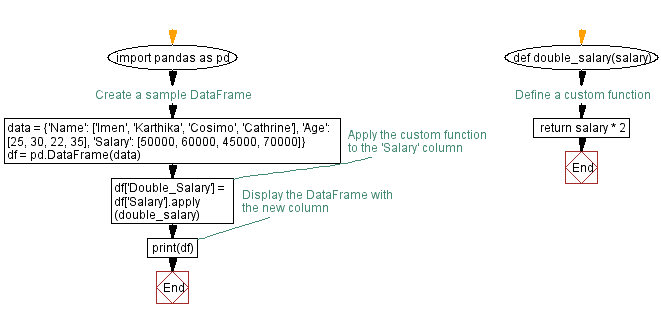Applying custom function to salary: Pandas DataFrame operation
Apply a custom function to each element in a Pandas DataFrame.
Sample Solution:
Python Code:
import pandas as pd
# Create a sample DataFrame
data = {'Name': ['Imen', 'Karthika', 'Cosimo', 'Cathrine'],
'Age': [25, 30, 22, 35],
'Salary': [50000, 60000, 45000, 70000]}
df = pd.DataFrame(data)
# Define a custom function
def double_salary(salary):
return salary * 2
# Apply the custom function to the 'Salary' column
df['Double_Salary'] = df['Salary'].apply(double_salary)
# Display the DataFrame with the new column
print(df)
Output:
Name Age Salary Double_Salary
0 Imen 25 50000 100000
1 Karthika 30 60000 120000
2 Cosimo 22 45000 90000
3 Cathrine 35 70000 140000
Explanation:
Here's a breakdown of the above code:
- First we create a sample DataFrame (df) with columns 'Name', 'Age', and 'Salary'.
- Next we define a custom function "double_salary" that doubles the input value.
- The df['Salary'].apply(double_salary) line applies the custom function to each element in the 'Salary' column.
- The result is stored in a new column 'Double_Salary', which is added to the DataFrame.
- The DataFrame with the new column is printed.
Flowchart:

Python Code Editor:
Previous: Sorting Pandas DataFrame by values: Python data manipulation.
Next: Renaming columns in Pandas DataFrame.
What is the difficulty level of this exercise?
Test your Programming skills with w3resource's quiz.
